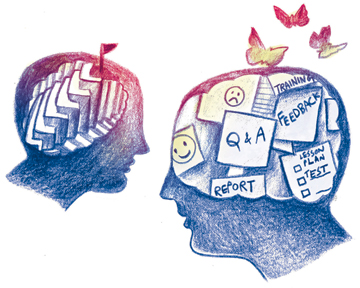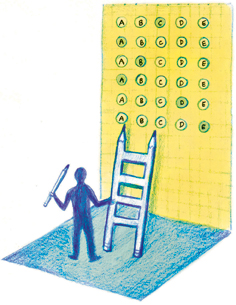Simran Luthra
The National Education Policy (NEP) 2020 mentions the institutionalization of teacher performance appraisals as well as the creation of National Professional Standards for Teachers (NPST). These moves are being welcomed at large and seem to be veering in the direction of better career management and greater professionalism for teachers. However, this is a move that has already been made by several other countries. What does the evidence from their experience teach us? What does it mean in the grander scheme of things?
This article explores what teacher assessment currently entails and what the proposed direction could imply. The aim is to raise some questions and explore what teachers can seek to embrace and what they need to, perhaps, be wary of or aware of, at the least when it comes to teacher evaluation.
How is teaching currently assessed?
I reached out to a few teachers to understand their experiences and opinions of the current scenario of teacher assessment to get a sense of what teachers themselves have to say. Unsurprisingly, teachers’ experiences and opinions vary widely based on the schools they have taught at or are teaching at.

There are various ways in which teachers are assessed and rated at present: shadowing and observation of classes, lesson plan demonstrations, and written tests that cover both subject as well as pedagogical content knowledge are reportedly some popular ways of evaluating and providing feedback to teachers. Observations could also include reviewing aspects such as punctuality, body language and posture, manner of greeting, student engagement and responsiveness, adherence to the lesson plan, as well as classroom management. Such forms of teacher evaluation are usually undertaken by coordinators, principals, academic heads, or even dedicated teams for larger group schools. Correlating student performance in examinations with teacher performance is yet another mechanism for teacher evaluation. However, there isn’t much transparency around how tightly this is tied to teacher evaluation or how it impacts things such as salary increments or promotions.
Teachers also shared how a sort of ‘formative assessment’ of teachers is also a reality with CCTV cameras present in several classrooms so that they can be monitored not only on set observation days but on any given day. Further, the overall behaviour and demeanour of teachers are also under scrutiny throughout the year and play a role in whether or not they are considered for more responsibilities and so on.
Most teachers felt that evaluation and feedback are important so that complacency does not set in and for enabling improvement of their teaching practice. However, a few also shared how the pressure on teachers was immense; how judging teachers based on student performance was unfair, since classroom teaching isn’t always the only factor that impacts student performance; how teachers are assessed not just inside classrooms but also outside classrooms and how well they perform on multiple parameters and tasks, ranging from parental feedback, revision tests before exams, remedial classes, worksheet and lesson plan preparation, question paper setting and correction – all add to the mounting pressure on teachers. Added to this is the unending scope of professional development and continuous improvement.
The evolution of schooling and teaching
The cultural meaning of teaching and what it means to be a teacher have changed radically over time. There has been a rise, in what in research literature is referred to as the ‘culture of performativity’, whereby “teachers’ work and worth are continuously measured and the quickest input-output ratio is pursued at all costs”1. The work that comes to be valued in a ‘performance culture’ is that which is visible, measurable, and can be translated into results, so that one set of results can be measured and compared to another. It is the growing prevalence of this culture world-over, that has led to the over-emphasis on documentation work that teachers so often lament, as well as the undue importance given to test results, under the pressure of which young minds are crumbling.
What performativity does is that it suppresses creativity and innovation in teaching. When test scores and exam results become all that matter to schools and parents and even become a parameter for judging teachers, it leads to the ‘teach-to-test’ phenomenon. This implies that teachers naturally begin to focus disproportionately on preparing students to succeed in examinations. This tends to be at the cost of engaging students in more creative ways or following up on interests that students may express if they lie outside of the mandated syllabus. This could result in missed opportunities to engage learners and participate in educational processes that are truly meaningful and liberating.
Renowned education scholar, Stephen Ball, summarizes the impact of the performance culture by pointing out how, “we become uncertain about the reasons for actions. Are we doing this because it is important, because we believe in it, because it is worthwhile? Or is it being done ultimately because it will be measured or compared?2” (2003, p.220). A dilemma I am sure, many teachers reading this would resonate with.
What gets measured gets improved?
The world today, nearly in all spheres at present, is obsessed with data. Right from the government and corporations, to NGOs, there is faith that data will prove effective in determining the causes of problems. In fact, the age we live in is now being referred to as the ‘age of analytics’ and it comes as no surprise that this approach has also percolated into our educational systems and institutions, including the direction teacher evaluation seems to be taking. This phenomenon is part of the larger corporatization of education, in which schools are increasingly running like businesses. (Devi Kar, Director of Modern High School for Girls, Kolkata, has recently written a scathing review3 of this scenario which I highly recommend everyone working in education, reads.)
We are living at a moment in time when we are all deeply entrenched in the culture of measurement. We measure everything: the number of steps we walk, the number of calories we consume, the regularity of our habits through trackers, our schedules; everything is driven towards productivity, measurable and tangible output. In fact, we feel rather virtuous about this entire way of being. We’re barely bothered to ask who wants us to measure and why? What other industries and economies is this whole measurement game fuelling and funding?
It hence seems logical to extend measurement to all human activities, including teaching. But can the work that teaching is be truly measured? How does one measure the emotional labour involved in teaching or the differential time and effort for preparation? How does one quantify poetry appreciation or critical thinking?

To evaluate or not to evaluate is not the question
All of this is not to argue that teacher evaluation or assessment is undesirable or unnecessary. However, our understanding of teacher evaluation and its purposes need to be broadened to cater to loftier goals of education. Here are a few other ways of teacher evaluation that could prove to be worthwhile, even if not high on their measurability index.
A commonly ignored aspect of teacher evaluation is self-assessment based on reflection. While several teacher preparation courses focus considerably on teacher diaries as tools for reflection, this is hardly practiced or encouraged as a method of teacher evaluation. This is probably because it is highly subjective in nature and hence not measurable.
However, self-reflection on the part of teachers is extremely valuable. It is only the individual teacher who can understand the nuances of where her students stand on a given day in relation to what is being taught, the energy of the classroom, why they chose to spend more time on something as opposed to something else, or why they decided to adopt a certain method over another. Reflection allows teachers to think deeply about the needs and abilities of their learners. Genuine reflection should allow teachers to be able to get into the heads of their students; to be able to evaluate how well they are implementing chosen pedagogic practices, and decide on what they want to create or experiment with next to gain maximum success. In light of this, don’t sporadic classroom observations seem fragmentary and disjunctive in comparison?
Again, this is not to discard peer observation as a beneficial form of feedback for teachers. Peer observation or formative observations can be a rich source of learning for teachers but they should ideally be multiple observations, not a one-time thing. Again, while observations can be used to provide feedback to improve teaching, they should be considered as evidence of overall teaching effectiveness.
Formative assessment of student learning is primarily supposed to be feedback for teachers. It is supposed to be assessment for learning. However, owing to the culture of performativity, in several instances, schools convert formative assessments into pen-and-paper tests even though there are supposed to be alternative ways of seeking evidence of learning such as classroom discussions, group work, games, teacher-led question-answer sessions, and so on.
Teacher portfolios albeit a time-consuming endeavour, can be a great way of combining reflection, evidence of student learning, and efforts towards teacher preparation over an extended period of time. Of course, the format of teacher portfolios would determine how effective and authentic they prove to be, but they do allow for a greater expression of teacher development over time. International research suggests that portfolios have proven to be a meaningful way of teacher evaluation.
Final thoughts…
The move is in alignment with the ‘age of analytics’ that we currently inhabit and may seem unavoidable. Hence, while we welcome the setting of standards and procedures for measurable teacher evaluation along with their promise of better career progression and professionalism, it is also imperative that we remain cognizant of the pitfalls and potential dangers of such a system which may not be easily discernible. Care has to be taken that teacher evaluation does not end up disempowering teachers. For instance, the practice of tying teacher evaluation to student learning outcomes in examinations without alleviating the circumstances that create disadvantage is unfair4.
The work that is teaching is an amorphous combination of science and art. There can be considerable philosophical debate on whether teaching tends towards science or art, and perhaps the debate can be laid to rest by saying that there is considerable science in art. Put simply, teaching is highly complex work. It is the orchestrating of meaningful learning experiences for a group of individuals, each unique. Teacher evaluation and assessment hence need to be humanistic and deep as opposed to mechanistic and shallow. It is not the need for assessment that is to be questioned, but the modalities and purposes of evaluation that demand greater attention and thought.
References
- https://www.litnet.co.za/performativity-phenomenon-education/
- Ball, S.J. (2003). ‘The teacher’s soul and the terrors of performativity,’ Journal of Education Policy 18(2), pp. 215-228.
- https://www.telegraphindia.com/opinion/corporate-education-schools-in-india-are-undergoing-an-unexpected-transformation/cid/289456
- Nicholson-Goodman, J. (2011). The “highly qualified teacher” trope: Education policy and democratic teacher development in the face of risk, uncertainty, and blame. Critical Education, 2(11). Retrieved 8 May 2022 from http://m1.cust.educ.ubc.ca/journal/index.php/criticaled/article/view/75
The author is based in Pune and is currently pursuing her PhD. in Education from TISS, Mumbai. She has completed her Masters in English from Jadavpur University and Masters in Education (Elementary) from TISS, Mumbai and taught Hindi at Stanford University, California while on a Fulbright fellowship. She is passionate about language, social studies education, human rights, gender, life skills and teacher education in particular. She can be reached at simranluthra@gmail.com.
Related Artice
